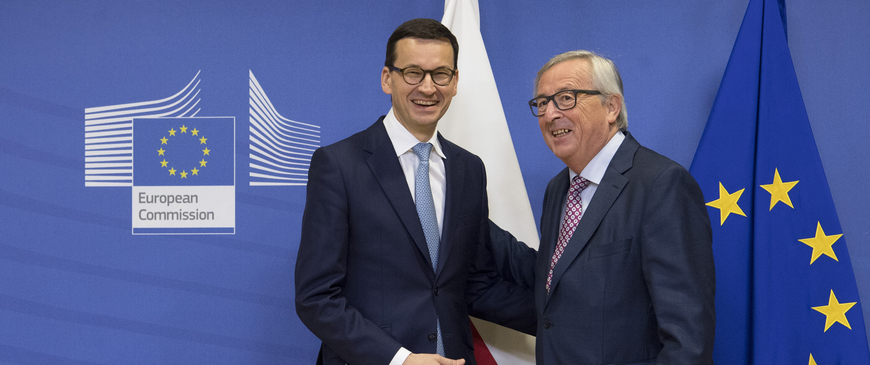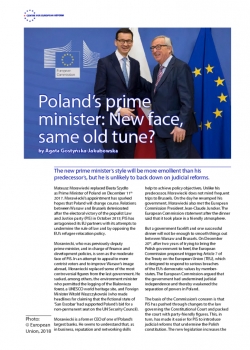
Poland’s prime minister: New face, same old tune?
The new prime minister’s style will be more emollient than his predecessor’s, but he is unlikely to back down on judicial reforms.
Mateusz Morawiecki replaced Beata Szydło as Prime Minister of Poland on December 11th 2017. Morawiecki’s appointment has sparked hopes that Poland will change course. Relations between Warsaw and Brussels deteriorated after the electoral victory of the populist Law and Justice party (PiS) in October 2015; PiS has antagonised its EU partners with its attempts to undermine the rule of law and by opposing the EU’s refugee relocation policy.
Morawiecki, who was previously deputy prime minister, and in charge of finance and development policies, is seen as the moderate face of PiS. In an attempt to appeal to more centrist voters and to improve Warsaw’s image abroad, Morawiecki replaced some of the most controversial figures from the last government. He sacked, among others, the environment minister who permitted the logging of the Bialowieza forest, a UNESCO world heritage site, and Foreign Minister Witold Waszczykowski (who made headlines for claiming that the fictional state of ‘San Escobar’ had supported Poland’s bid for a non-permanent seat on the UN Security Council).
#Morawiecki seems to understand that, as in business, reputation and networking skills help to achieve policy objectives.
Morawiecki is a former CEO of one of Poland’s largest banks. He seems to understand that, as in business, reputation and networking skills help to achieve policy objectives. Unlike his predecessor, Morawiecki does not mind frequent trips to Brussels. On the day he revamped his government, Morawiecki also met the European Commission President Jean-Claude Juncker. The European Commission statement after the dinner said that it took place in a friendly atmosphere.
But a government facelift and one successful dinner will not be enough to smooth things out between Warsaw and Brussels. On December 20th, after two years of trying to bring the Polish government to heel, the European Commission proposed triggering Article 7 of the Treaty on the European Union (TEU), which is designed to respond to serious breaches of the EU’s democratic values by member-states. The European Commission argued that the government had undermined judicial independence and thereby weakened the separation of powers in Poland.
The basis of the Commission’s concern is that PiS has pushed through changes to the law governing the Constitutional Court and packed the court with party-friendly figures. This, in turn, has made it easier for PiS to introduce judicial reforms that undermine the Polish constitution. The new legislation increases the party’s influence over the way in which courts are organised. Among other things, it dismisses the current members of the National Judiciary Council (which selects judges) and gives the Sejm (the lower chamber of the parliament) where PiS and its allies have a majority, the right to appoint new members of that council. The new law also potentially enables PiS to oust around 37 per cent of the current Supreme Court judges, by forcing them into early retirement. New judges will be appointed by the President on the recommendation of the new Judicial Council.
The European Commission worries that the actions of PiS will not only weaken democratic checks and balances in #Poland but also damage the EU’s single market.
The European Commission worries that the actions of PiS will not only weaken democratic checks and balances in Poland but also damage the EU’s single market. As a recent CER policy brief, ‘Can EU funds promote the rule of law in Europe?’ argued, when judicial independence is undermined, investors can no longer be confident that their rights will be adequately protected.
Article 7 TEU is a multi-stage process; at least 22 member-states must first agree that there is a clear risk of a serious breach of EU values in Poland. If Warsaw does not change course in response, the European Council can decide unanimously (minus Poland) that Warsaw is seriously and persistently breaching EU values, potentially leading to the suspension of Poland’s voting rights in the Council of Ministers.
The European Commission is only asking member-states to support the first stage of the process. But even this could do more harm than good if it leads to increased euroscepticism in Poland. Poles are today highly supportive of their country’s membership in the EU, but many of them might consider judicial reforms to be domestic affairs in which the EU should not meddle.
The Commission’s proposal has given the other EU member-states a headache, too. Some German and French officials have signaled that Berlin and Paris would probably back the Commission and vote to launch the first stage of Article 7 TEU. But other EU capitals have been more reluctant to condemn the Polish government openly, either because they object on principle to the idea of sanctioning EU countries for bad domestic behaviour; because they might need Poland’s backing in some other area; or because they have their own problems with the rule of law. Bulgaria, which holds the presidency of the Council of Ministers, has been criticised by the Commission for insufficient progress in reforming its own judiciary. Bulgarian prime minister Boyko Borisov argued that the Commission’s Article 7 proposal would give the EU “sleepless nights” if it went to a vote.
The European Commission recognises that using Article 7 TEU could be a double-edged sword. As a result, the Commission has said that if the Polish government addresses its concerns within three months, it will consider dropping the case.
The European Commission is only asking member-states to support the first stage of the process. But even this could do more harm than good if it leads to increased euroscepticism in Poland.
But even under Morawiecki, Warsaw is unlikely to back down. Jarosław Kaczyński, the PiS leader who effectively pulls the strings in the government, thinks Poland’s courts are full of judges who worked under the communist regime and that they should be ousted. Morawiecki, who also belonged to the Polish anti-communist opposition, seems to agree that the reforms will improve the Polish judiciary. Besides, public support for PiS has not budged since the party pushed through the judicial reforms: that allows PiS to argue that Poles have given the party free rein.
Morawiecki will try to use the time the European Commission has given him, and Bulgaria’s reluctance to proceed with the Commission’s proposal, to visit member-states and make a positive case for the new legislation. In order to block the Commission, the Polish government needs to convince at least six member-states to oppose the Council decision or to abstain. Morawiecki hopes that his more emollient style will help sway reluctant EU capitals.
PiS thinks that Poles have given the party free rein because the public support for the party has not fallen after it pushed through judicial reforms.
Morawiecki might be right that he can find six supporters. But he will waste a lot of political capital that his government will need in the next two years. In May the European Commission will put forward its proposal on the multi-annual budget after 2020. With less income post-Brexit, the EU is likely to reduce EU funding for net recipients, of which Poland is currently the largest. The Commission has also been under pressure from some of the EU’s net payers, who argue that the best way to ensure member-states respect the rule of law is to make EU funding conditional upon it.
Morawiecki should concentrate on mending fences with the European Commission and net payers ahead of the big budget battle. Morawiecki’s charm offensive over Article 7 may buy the prime minister some time, but in the long run it might cost Poland money, as well as friends in Brussels.
Agata Gostyńska-Jakubowska is a senior research fellow at the Centre for European Reform.

